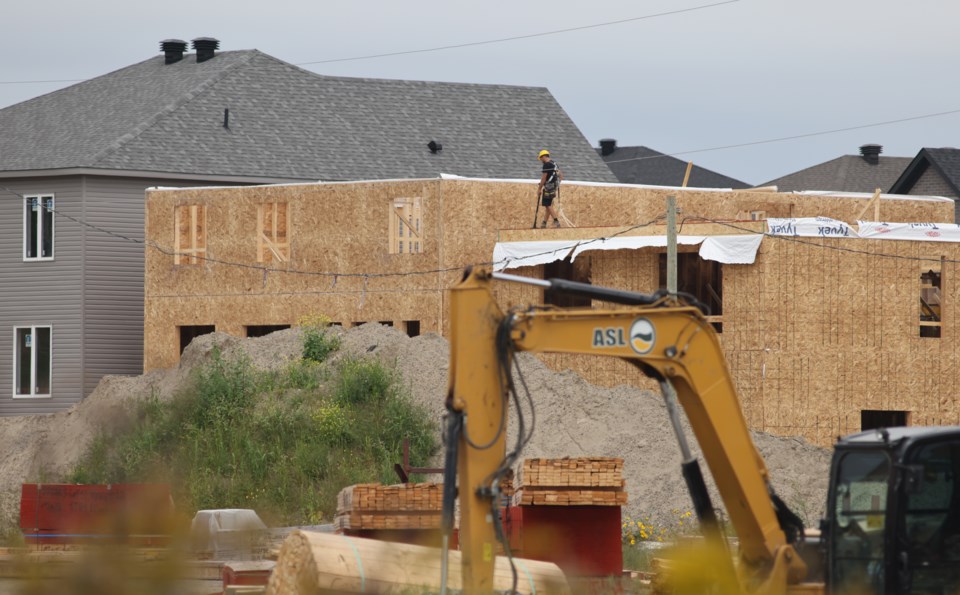A day after Premier Doug Ford’s government released its fall economic statement showing it’s fallen well behind on its key homebuilding target, his Progressive Conservatives were forced to play defence over the foremost challenge of their second mandate.
Ford, Finance Minister Peter Bethlenfalvy, and Housing Minister Paul Calandra each defended their government’s record on housing on Thursday, with the latter minister promising that it “will not fail” to get 1.5 million new homes built in Ontario between 2022 to 2031.
A day earlier, the province’s fall economic statement tabled by Bethlenfalvy projected housing starts in Ontario to decline for the second consecutive year in 2024. Slight increases in housing starts forecasted from 2025 to 2027 in the fall economic statement would still fall well short of the government’s annual targets.
In 2022, the Ford government promised to facilitate the construction of 1.5 million new homes in the next decade, an amount an expert panel it appointed determined “must” be reached “to address the supply shortage” in Ontario. For the Progressive Conservatives to reach their target, an average of 150,000 new homes would need to be built each year.
There were about 82,000 housing starts per year, on average, in Ontario from 2018 to 2021.
The Ford government planned to facilitate the gradual increase in the number of new homes under construction each year until 2026, when its hope was for 175,000 homes to be built in Ontario year after year.
In 2022, there were 96,080 housing starts in the province, followed by 89,297 in 2023, according to the Canada Mortgage and Housing Corporation’s data. The province is on track for 81,300 housing starts in 2024, the finance minister’s fall economic statement projected.
“We will not fail on the goal of building 1.5 million homes and giving everybody the opportunity to have the very same dream that millions, and generations, of Ontarians have always had,” Calandra, the housing minister, told journalists at Queen’s Park on Thursday.
“I have a target — I'll meet that target, and I'll remove obstacles so that I reach that target,” he added.
The number of housing starts forecasted in the fall economic statement is based on “if things don’t change,” Calandra said. The government’s ongoing actions to help municipalities build housing-enabling infrastructure — like water and wastewater facilities — will help, as will lower interest rates, the housing minister said.
Higher-than-usual interest rates over the past few years have hurt homebuilders’ efforts by making borrowing more expensive.
“Looking ahead, lower mortgage rates and more accommodative mortgage regulations recently announced by the federal government are expected to help housing demand recover,” Bethlenfalvy’s fall economic statement said.
Some of the Ford government’s housing woes have been self-inflicted. The Greenbelt scandal and the slew of housing policy reversals that followed it disrupted the homebuilding sector. Ford’s PCs have also grappled internally over whether to take more aggressive steps to encourage housing construction — some of which have ultimately been shot down.
On Thursday, Calandra also teased some “additional pieces that we’re going to be bringing forward” to spur building.
The attention of the legislature was on the Ford government’s slow progress on housing on Thursday, with opposition parties casting doubt on the idea that the government would hit its target.
NDP Leader Marit Stiles pitched her recently announced “Homes Ontario” plan to involve the government directly in housing construction, saying the private market won’t build enough alone.
Those in the Ford government “just keep kinda rolling the dice and hoping somebody else is gonna fix this problem for them,” Stiles said.
Liberal housing critic Adil Shamji said Alberta and British Columbia, which are outperforming Ontario in the face of similar housing challenges, are putting the country’s largest province to shame.
“This is getting pushed to the point of absurdity,” Shamji said. “This government cannot build houses when interest rates are up. They also cannot build houses when interest rates are down.”
Green Leader Mike Schreiner highlighted that Ford’s government has shot down as-of-right fourplexes, the possibility of expanding rent control, and hasn’t adequately built “deeply affordable, non-profit and co-op housing.”
“Until the premier actually starts saying yes to building homes people can afford in the communities they love, this crisis will not be solved,” Schreiner said.
In responding to an NDP MPP’s question about housing on Thursday, Ford touted actions the government has taken including removing HST on purpose-built rentals and its $3-billion increase in funding in recent years to support municipalities’ housing-enabling infrastructure projects or those that are hitting their targets.




